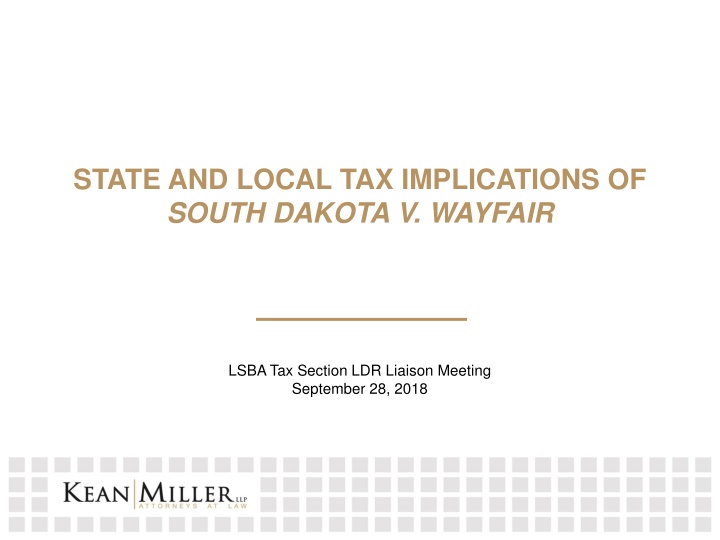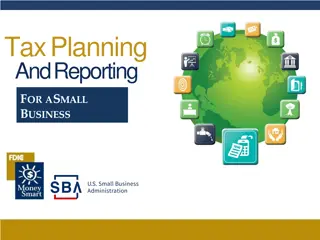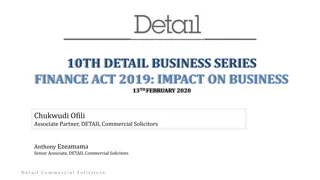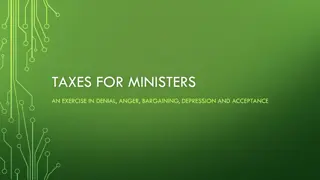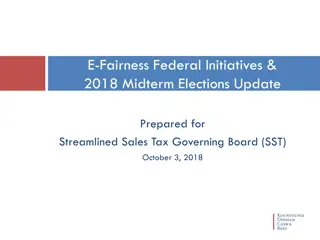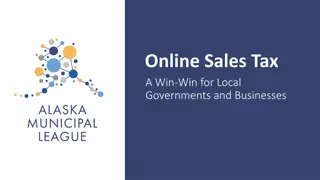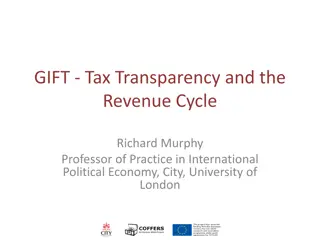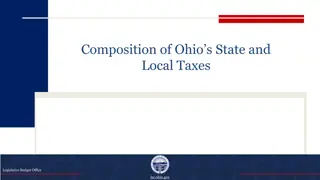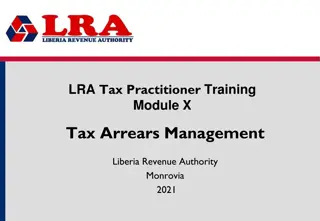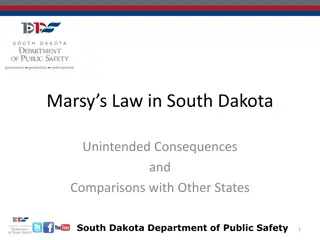State and Local Tax Implications of South Dakota v. Wayfair
Overview of the implications of the South Dakota v. Wayfair case on state and local taxes, including discussions on the dormant Commerce Clause, substantial nexus requirement, interstate commerce regulations, and the creation of a substantial nexus sufficiency test. The case challenges the traditional physical presence rule for tax collection, highlighting the impact on e-commerce businesses operating across state lines.
Download Presentation

Please find below an Image/Link to download the presentation.
The content on the website is provided AS IS for your information and personal use only. It may not be sold, licensed, or shared on other websites without obtaining consent from the author.If you encounter any issues during the download, it is possible that the publisher has removed the file from their server.
You are allowed to download the files provided on this website for personal or commercial use, subject to the condition that they are used lawfully. All files are the property of their respective owners.
The content on the website is provided AS IS for your information and personal use only. It may not be sold, licensed, or shared on other websites without obtaining consent from the author.
E N D
Presentation Transcript
STATE AND LOCAL TAX IMPLICATIONS OF SOUTH DAKOTA V. WAYFAIR LSBA Tax Section LDR Liaison Meeting September 28, 2018
AGENDA South Dakota v. Wayfair Overview Holding Louisiana Response Other States Responses Other Issues Income Tax Implications Related Issues Information Reporting Affiliate/Marketplace/ Dealer Nexus
SOUTH DAKOTA V. WAYFAIR OVERVIEW South Dakota v. Wayfair, Inc., Dkt. No, 17-494, 585 U.S. __ (June 21, 2018) Guiding dormant Commerce Clause Principles State regulation may not discriminate against interstate commerce Per se invalid State may not impose undue burden on interstate commerce State law that regulates even handedly to effectuate a legitimate local interest will be upheld unless the burden on interstate commerce is clearly excessive in relation to the putative local benefits (Pike v. Bruce Church, 397 U.S. 137 (1970))
SOUTH DAKOTA V. WAYFAIR OVERVIEW (CONT.) Quill is flawed on its own terms Physical presence rule not necessary interpretation of the substantial nexus requirement Creates rather than resolves market distortion Imposes arbitrary, formalistic modern Commerce Clause jurisprudence distinction disavowed by Extraordinary imposition by judiciary on States authority to collect taxes and perform critical public functions Judicially created tax shelter
SOUTH DAKOTA V. WAYFAIR OVERVIEW (CONT.) Stare decisis rejected Court may not prohibit a state from exercising its lawful power in our federalist system Inappropriate to ask Congress to resolve a false constitutional premise created by the Court Congress can resolve any problems associated with overturning Quill and Bellas Hess overruled
SOUTH DAKOTA V. WAYFAIR HOLDING Creation of a Substantial Nexus Sufficiency Test For purposes of the substantial nexus prong of Complete Auto Transit v. Brady, [Substantial nexus] is established when the taxpayer [or collector] avails itself of the substantial privilege of carrying on business in that jurisdiction. Taxpayers satisfied test [B]ased on both the economic and virtual contacts [R]espondents are undoubtedly maintain an extensive virtual presence large, national companies that Remanded to South Dakota Supreme Court
SOUTH DAKOTA V. WAYFAIR HOLDING NEW SUBSTANTIAL NEXUS SUFFICIENCY TEST New undefined types of contacts Substantial virtual connections Extensive virtual presence Passive vs. Interactive? Targeting required? Non-economic contacts? Tacit endorsement of cookie/software nexus Minimum threshold undefined for lower courts to determine How much contact is enough? Wayfair now only existing guidance No fact specific analysis in Wayfair opinion
SOUTH DAKOTA V. WAYFAIR HOLDING NEW SUBSTANTIAL NEXUS SUFFICIENCY TEST (CONT.) Distinction between Commerce Clause and Due Process Muddies or removes the distinction between Commerce Clause and due process analysis? Similar to income tax economic nexus cases? Similar to due process minimum contacts and purposeful availment? Unrelated?
SOUTH DAKOTA V. WAYFAIR HOLDING NEW SUBSTANTIAL NEXUS SUFFICIENCY TEST (CONT.) Other Commerce Clause Principles Pike v. Bruce Church undue burden analysis required even if Complete Auto test satisfied? Regulation vs. tax levy Retroactivity Constitutional decision retroactive Limits on retroactivity? Financial statement implications Q2 event Potential for significant tax reserves
SOUTH DAKOTA V. WAYFAIR HOLDING NEW SUBSTANTIAL NEXUS SUFFICIENCY TEST (CONT.) Future SALT Jurisprudence Increased deference to states? More aggressive tax laws? Increased emphasis on Due Process Tax Planning and M&A Implications Prospect for Post-Wayfair Congressional Action
SOUTH DAKOTA V. WAYFAIR SALES AND USE TAX IMPLICATIONS General Principles Safe harbor for those who transact limited business; No retroactivity; Reduced administrative and compliance costs by: Providing single level tax administration; Providing uniform definitions of products and services; Providing simplified tax rate structures, and other uniform rules; Is Streamlined Membership required? Access to software paid for by the taxing authority; and Sellers who choose to use that software immune from audit liability
SOUTH DAKOTA V. WAYFAIR LOUISIANA RESPONSE TO WAYFAIR Tax Foundation Red Light State Louisiana Sales and Use Tax Commission for Remote Sellers Established within the Louisiana Department of Revenue by Act 274 of the 2017 Regular Session Act 5 (H.B. 17) 2018 Second Extraordinary Session $100,000 or 200-transaction threshold Currently meeting Uniform Local Sales Tax Board On a parallel track
SOUTH DAKOTA V. WAYFAIR LOUISIANA RESPONSE TO WAYFAIR (CONT.) Remote Sellers Information Bulletin 18-001 (Aug. 10, 2018) Prospective Enforcement - January 1, 2019 Notice and Reporting Requirements (Act 569 of 2016 Regular Session) La. R.S. 47:302(K) Direct Marketer Sales Tax Return
SOUTH DAKOTA V. WAYFAIR LOUISIANA RESPONSE TO WAYFAIR (CONT.) HCR7 (2018 3rdExtraordinary session) Creates the Sales Tax Streamlining and Modernization Commission as the successor to the original commission created by Act 405 in the 2015 Regular legislative session and continued by Act 564 in the 2016 Regular legislative session. The goal is to ensure both revenue stability and taxpayer equity through the adoption of proven contemporary tax policies.
SOUTH DAKOTA V. WAYFAIR OTHER STATES RESPONSES TO WAYFAIR Measured Response Many states appear to be attempting to comply with the roadmap in Wayfair But some states imposing (or proposing to impose) higher thresholds Threshold measurement periods vary Previous calendar year Previous or current calendar year Preceding 12-months Preceding 12-months measured as of a specific date Annual sales or Annually States appear to be enforcing prospectively but Some state guidance, such as Hawaii, contains retroactive catch-up language (see Hawaii Dept. of Tax n, Announcement No. 2018-10, amended July 10, 2018) Non-Streamlined states do not appear to view lack of participation as a barrier Some states appear to be willing to negotiate prospective compliance
SOUTH DAKOTA V. WAYFAIR OTHER STATES RESPONSES TO WAYFAIR (CONT.) Enforcement Dates Several states asserting an October 1, 2018 enforcement date Other states looking to 2019 either because of effective dates in enacted legislation or because legislative action is required in the 2019 session Outliers July 1, 2018 HI, ME, VT September 1, 2018 MS November 1, 2018 NC, SC and SD December 1, 2018 CT
SOUTH DAKOTA V. WAYFAIR OTHER POTENTIAL ISSUES Other Potential issues Mass. and Ohio cookie/software nexus Local enforcement Lack of safe harbor Nexus threshold? Marketplace facilitators Prospect of multiple dealers Multiple sets of guidance required? Ongoing audits, existing assessments and pending litigation
SOUTH DAKOTA V. WAYFAIR INCOME TAX IMPLICATIONS More aggressive enforcement Undefined floor - Nexus threshold Retroactive? Economic Nexus Factor Presence Standards Non-economic nexus? P.L. 86-272 Virtual contacts that exceed solicitation Tax Planning and M&A Choice of entity Business structuring
SOUTH DAKOTA V. WAYFAIR RELATED ISSUES USE TAX REPORTING REQUIREMENTS Act 569 (H.B. 1121) 2016 Regular Session Wayfair has no impact on notice and reporting requirements Louisiana has adopted Colorado-style remote seller reporting requirements on remote retailer sales to in-state customers For purposes of the law, a remote retailer is a retailer that avails itself of the benefits of an economic market in Louisiana and: 1) is not required by law to collect Louisiana sales and use taxes 2) makes retail sales of taxable property or services delivered into Louisiana and the cumulative annual gross receipts from those sales exceeds $50,000 per calendar year 3) does not collect and remit Louisiana sales and use taxes
SOUTH DAKOTA V. WAYFAIR RELATED ISSUES USE TAX REPORTING REQUIREMENTS (CONT.) Act 569 (Cont.) Remote retailer must: Notify the in-state purchaser that a purchase is subject tax unless it is specifically exempt, and that use tax liability must be paid annually Mail Louisiana customers an annual notice by Jan. 31 containing the amount paid by the purchaser for purchases made in the preceding calendar year Provide an annual statement to the Louisiana Department of Revenue by March 1 including the total amount paid by each of the retailer s customers Similar to Colorado legislation at issue in Direct Marketing Assoc. v. Brohl Effective July 1, 2017
SOUTH DAKOTA V. WAYFAIR RELATED ISSUES AFFILIATE/MARKETPLACE/ DEALER NEXUS Normand, v. Wal-Mart.com, Dkt. No. 769-149 (La. 24th Judicial Dist. Ct. March 2, 2018) Marketplace facilitator was a dealer for purposes of Louisiana sales and use tax laws solely because it engaged in solicitation of a customer market and despite that fact that it never owned or sold the good at issue Currently on appeal Oral argument scheduled October 11, 2018
